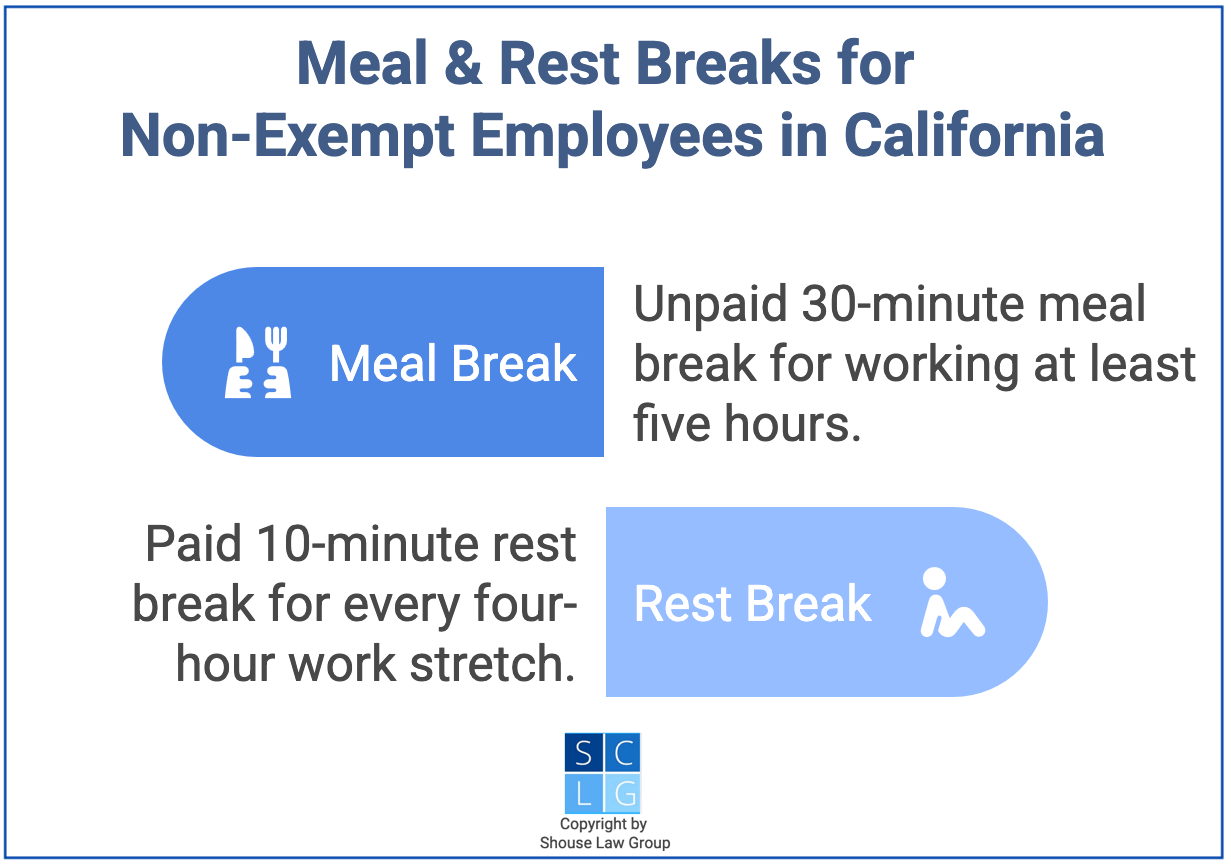Under California law, all non-exempt employees are entitled to unpaid 30-minute meal breaks and paid 10-minute rest breaks depending on the length of the workday. If your boss makes you work through a meal or rest break, they owe you an additional hour of pay at your regular rate for that workday.1

Below, our California employment and labor law attorneys will address the following key issues regarding meal and rest break requirements for non-exempt employees:
- 1. Meal and Rest Break Rules
- 2. Eligibility
- 3. Working During Breaks
- 4. Remedies
- Frequently Asked Questions
- Additional Resources
1. Meal and Rest Break Rules
Meal Breaks
If you are a non-exempt employee in California and work more than five hours in a workday, you are entitled to an unpaid 30-minute meal break. However, you can waive that meal break if you do not work more than six hours in the workday.2
In addition, if you are working more than 10 hours in a workday, you must also get a second unpaid 30-minute meal break.3 The first meal must start no later than the end of the fifth hour, and the second meal no later than the end of the tenth hour. However, you may waive this second meal break if:
- Your workday will be no longer than 12 hours, and
- You did not waive the first meal break.4
Example: Rick is working an 11-hour shift at a fulfillment center. Rick is entitled to two 30-minute meal breaks over the course of his shift. However, if Rick takes his lunch break, he and his employer may agree that he will waive the dinner break.
The following chart matches hours worked to the number of meal breaks an employer must provide:
|
Hours Worked by Non-Exempt Employees in California |
Unpaid 30-Minute Meal Breaks Required |
| Up to 5 hours | 0 |
| More than 5 hours up to 10 hours | 1 |
| More than 10 hours up to 15 hours | 2 |
| More than 15 hours up to 20 hours | 3 |
| More than 20 hours | 4 |
Note employers generally may not require you to remain on premises during meal breaks.5 Also, employers do not have to remind you when your meal starts. Taking your break is your responsibility.
Rest Breaks
If you are a non-exempt employee in California, you are entitled to a paid rest period of at least 10 minutes for each four-hour stretch (or major fraction thereof) you put in during the workday. Furthermore:
- The break cannot be interrupted;
- The 10 minutes must be consecutive;
- You cannot be required to remain on the work premises; and
- Rest breaks generally cannot be combined together or with meal breaks.
These rest breaks must be counted as time worked and must be paid time. The break time must also be in the middle of your work period (to the extent that this is practicable).6
Example: Fern works an 8-hour shift at a nail salon. In addition to being entitled to a 30-minute meal break, Fern also must receive two ten-minute rest breaks (one for each four-hour stretch).
Rest periods are not required if you work less than three-and-a-half hours in a day.7 The following chart matches hours worked to the number of rest breaks an employer must provide:
|
Hours Worked by Non-Exempt Employees in California |
Paid 10-Minute Rest Breaks Required |
| Less than 3 ½ hours | 0 |
| 3 ½ hours up to 6 hours | 1 |
| More than 6 hours up to 10 hours | 2 |
| More than 10 hours up to 14 hours | 3 |
| More than 14 hours up to 18 hours | 4 |
| More than 18 hours up to 22 hours | 5 |

Workers are encouraged to take their meal and rest breaks for their physical and mental health.
2. Eligibility
Like California overtime laws, California meal and rest period requirements apply primarily to non-exempt employees.8
Therefore, you are generally not entitled to meal and rest break protections if you are an independent contractor or exempt employee. Exempt employees are typically executive, administrative, or professional workers who meet all of the following requirements:
- Spend more than half of their work time doing intellectual, managerial or creative work;
- Regularly exercise discretion and independent judgment in performing those duties; and
- Earn a monthly salary equivalent to at least twice the California minimum wage for full-time employment.9
However, there are certain professions exempt from overtime pay but still entitled to a meal and rest break under their specific Wage Orders, such as “inside salespeople.”
Unions and Other Workers
California’s meal and break protections do not apply to unionized employees in certain industries if qualifying collective bargaining agreements provide for meal breaks on a different schedule. For example, collective bargaining agreement provisions on meal breaks override the California laws for unionized employees who work:
- in construction occupations,
- as commercial drivers,
- as security officers,
- for electrical or gas companies, or
- in the motion picture industry.
There are also various industries that have their own meal and rest break rules, including baking, group homes, healthcare, and manufacturing.10

California non-exempt employees are entitled to a half-hour meal break after the fifth hour of work.
3. Working During Breaks
If you are a non-exempt employee in California, your employer generally may not require you to continue working or remain “on-call” during meal or rest breaks.11 To do so is legally equivalent to denying you your meal or rest break.
The only time your employer can require an “on-duty meal period” where you work during your break is if:
- The nature of the work prevents you from being relieved of all duty (for example, if you are a security guard and are the only person on duty); and
- You agree in a written waiver to have on-duty meal breaks. You are allowed to revoke this written agreement in writing at any time.12
Note that if you do not wish to take a rest or meal break, your employer can order you to take it anyway. They can also discipline or even fire you for not doing so.
Furthermore, employers have no obligation to ensure that you do not work during your meal or rest break. So if you voluntarily choose to work during a break, your employer is not held responsible.
However, employers cannot discourage, impede, or prevent you from taking your full, uninterrupted break. They must relieve you of all duty, relinquish control, and allow you a reasonable opportunity to take your break.13

Employers generally cannot make you work or be “on call” during meal breaks.
4. Remedies
If your employer fails to provide you meal or rest breaks as required under the California Labor Code, they will owe you one additional hour of pay – at your regular rate of pay – for each workday a meal or rest period was denied. This is called “premium pay.”
However, the law limits these “premium payments” to one hour per type of violation per workday. Therefore, you can recover up to two hours of premium pay in a single workday if both meal and rest breaks were denied. Missing multiple meal or rest breaks on the same workday does not increase the total owed beyond this two-hour cap.14
So if your employer denied you meal breaks for 250 workdays (about one year), they would owe you damages equivalent to 250 hours’ worth of pay at your regular rate (which includes non-discretionary bonuses/commissions).
Claims and Lawsuits
To recover your wages for lost meal and rest periods, you can file a wage claim with the California Labor Commissioner or bring a wage and hour lawsuit against your employer. If other employees are being denied their breaks as well, you may even be able to bring a class action lawsuit.
Note that California allows the following parties acting on behalf of an employer to be held individually liable if they cause or permit wage and hour violations:
- owners,
- directors,
- officers, and/or
- managing agents.15
Also note that you are entitled to any interest on your unpaid wages that accrues while your case is pending, known as “prejudgment interest.” The interest rate is seven percent a year unless a statute provides a higher rate.16

In California, a 10-minute rest break is required if a non-exempt employee works four hours.
Frequently Asked Questions
How much extra pay do I get if my employer makes me skip my meal or rest break?
If your employer denies you a meal break or rest break, they must pay you one additional hour of pay at your regular rate for each type of break missed per workday. The maximum is two extra hours of pay per day (one hour for missed meal breaks and one hour for missed rest breaks), even if you miss multiple breaks of the same type on the same day.
Can I choose to work through my break if I want to finish early?
Yes, you can voluntarily choose to work during your break, and your employer is not responsible if you make this choice. However, your employer cannot require, discourage, or prevent you from taking your full break. They must give you a reasonable opportunity to take an uninterrupted break and relieve you of all duties.
Do I qualify for meal and rest breaks if I’m a salaried employee?
It depends on your job duties and salary. If you’re an exempt employee (typically executives, administrators, or professionals who earn at least twice the minimum wage and use independent judgment), you generally don’t qualify for meal and rest breaks. However, if you’re a non-exempt employee regardless of how you’re paid, you are entitled to these breaks.
What should I do if my employer consistently denies me breaks?
You can file a wage claim with the California Labor Commissioner or bring a lawsuit against your employer to recover the extra pay you’re owed. If other employees are also being denied breaks, you may be able to join a class action lawsuit. You’re also entitled to interest on any unpaid wages while your case is pending.
Additional Resources
For more information, refer to the following:
- California Labor and Workforce Development Agency (LWDA) – An executive branch agency working to promote equitable and safe worksites, provide benefits, and encourage good employment for everyone who wants to work.
- California Labor Commissioner’s Office – Also called the Division of Labor Standards Enforcement (DLSE), this agency enforces labor laws by fighting wage theft and retaliation.
- California Civil Rights Department (CRD) – California agency tasked to fight workplace discrimination.
- California Division of Workers’ Compensation – Agency tasked with overseeing the administration of workers’ comp claims.
- U.S. Department of Labor – A federal agency to protect and enforce employment laws, including protecting job seekers and retirees.
Legal References:
- 8 C.C.R 11040.
- Labor Code 512 — Meal periods; requirements; order permitting meal period after six hours of work; exceptions; remedies under collective bargaining agreement. (“(a) An employer may not employ an employee for a work period of more than five hours per day without providing the employee with a meal period of not less than 30 minutes, except that if the total work period per day of the employee is no more than six hours, the meal period may be waived by mutual consent of both the employer and employee. An employer may not employ an employee for a work period of more than 10 hours per day without providing the employee with a second meal period of not less than 30 minutes, except that if the total hours worked is no more than 12 hours, the second meal period may be waived by mutual consent of the employer and the employee only if the first meal period was not waived.”).
- Same.
- Same. See also Salazar v. See’s Candy Shops, Inc., (Court of Appeal of California, Second Appellate District, Division Two, 2021) 64 Cal. App. 5th 85. See also Bradsbery v. Vicar Operating, Inc. (Cal.App. 2025) 110 Cal.App.5th 899 (written prospective (blanket) meal period waivers for shifts between five and six hours are enforceable as long as they are voluntary, revocable and not unconscionable or coercive).
- Estrada v. Royalty Carpet Mills, Inc. (Court of Appeal of California, Fourth Appellate District, Division Three, 2022) 76 Cal. App. 5th 685. See also Naranjo v. Spectrum Security Services, Inc. (2022) 13 Cal.5th 93.
- 8 California Code of Regulations (“C.C.R”) 11040. (“12. Rest Periods (A) Every employer shall authorize and permit all employees to take rest periods, which insofar as practicable shall be in the middle of each work period. The authorized rest period time shall be based on the total hours worked daily at the rate of ten (10) minutes net rest time per four (4) hours or major fraction thereof. However, a rest period need not be authorized for employees whose total daily work time is less than three and one-half (3 1/2) hours. Authorized rest period time shall be counted as hours worked for which there shall be no deduction from wages.”). See also Augustus v. ABM Security Services, Inc. (2016) 2 Cal.5th 257 (“During required rest periods, employers must relieve their employees of all duties and relinquish any control over how employees spend their break time.”).
- Same.
- 8 C.C.R 11040.
- Labor Code 515 — Exemptions [from meal and rest break requirements].
- Labor Code 512. See also Wage Order 16.
- Labor Code 226.7.
- 8 C.C.R 11040, section 11 (Meal Periods), endnote 4 above.
- Brinker Restaurant Corp. v. Superior Court (California Supreme Court, 2012) 53 Cal.4th 1004 (“On the most contentious of these, the nature of an employer’s duty to provide meal periods, we conclude an employer’s obligation is to relieve its employee of all duty, with the employee thereafter at liberty to use the meal period for whatever purpose he or she desires, but the employer need not ensure that no work is done…The employer satisfies this obligation if it relieves its employees of all duty, relinquishes control over their activities and permits them a reasonable opportunity to take an uninterrupted 30-minute break, and does not impede or discourage them from doing so.”)
- 8 C.C.R 11040.
- Labor Code 558.1 LC.
- Naranjo v. Spectrum (2022) 13 Cal. 5th 93.
